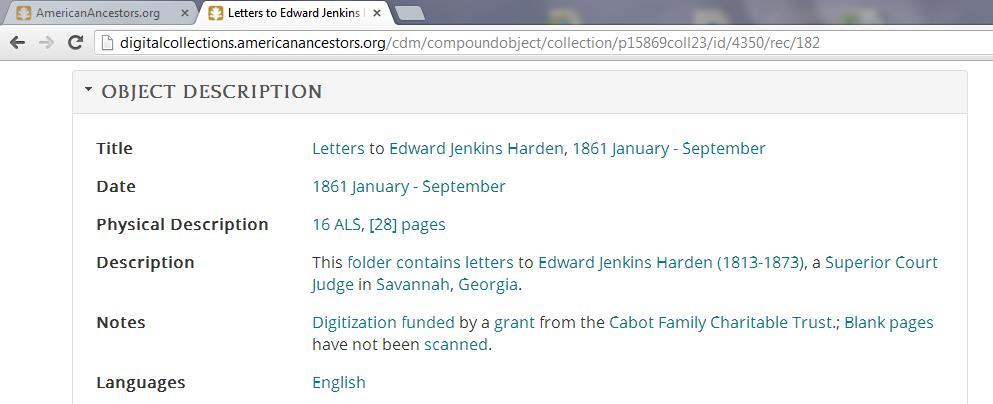 Much has happened with the Society’s Civil War digitization project, funded by the Cabot Family Charitable Trust, since Abbey Schultz’s last article on quality assurance. Our vendor completed all scans in June 2016, ending the imaging portion of the project. The focus then shifted to preparing the images to be uploaded into CONTENTdm software so they can be displayed on our Digital Collections website. Continue reading Metadata
Much has happened with the Society’s Civil War digitization project, funded by the Cabot Family Charitable Trust, since Abbey Schultz’s last article on quality assurance. Our vendor completed all scans in June 2016, ending the imaging portion of the project. The focus then shifted to preparing the images to be uploaded into CONTENTdm software so they can be displayed on our Digital Collections website. Continue reading Metadata
Tag Archives: The Well-Stocked Genealogical Library
Boston Transcript column now online
 The genealogy column in the Boston Evening Transcript newspaper has been one of the more heavily used resources at the NEHGS Library for the past century or more. The paper was published, under a few different titles, from 1830 to 1941. From 1906 through 1941, it featured a genealogy column in which readers would submit and respond to queries. During most of its run, the column appeared twice a week. According to an editors’ note which appeared in many issues, the newspaper was almost overwhelmed with submissions and had a backlog waiting to be published. The editors also claimed that they had “correspondents in every corner of the country.” By the time it ceased publication, the column had covered an estimated two million names. Continue reading Boston Transcript column now online
The genealogy column in the Boston Evening Transcript newspaper has been one of the more heavily used resources at the NEHGS Library for the past century or more. The paper was published, under a few different titles, from 1830 to 1941. From 1906 through 1941, it featured a genealogy column in which readers would submit and respond to queries. During most of its run, the column appeared twice a week. According to an editors’ note which appeared in many issues, the newspaper was almost overwhelmed with submissions and had a backlog waiting to be published. The editors also claimed that they had “correspondents in every corner of the country.” By the time it ceased publication, the column had covered an estimated two million names. Continue reading Boston Transcript column now online
Shorthand systems
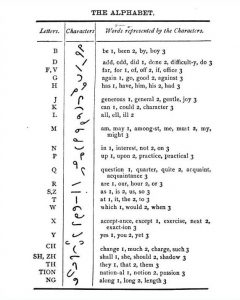
One day, when searching through the town records of New Haven, Connecticut, I was struck by one of the entries. The writing appeared like nothing I had ever seen before. After asking others for their thoughts, we found that none of us had ever seen this form of writing before. After some research, I discovered that what I had found was notation written in Taylor Shorthand, a system of writing developed by Samuel Taylor in 1786, the first system of shorthand writing to be widely used across the English-speaking world.[1]
Shorthand has long been used as a method of notation, often when time or efficiency is imperative, and as a result, it often appears in court documents and meeting minutes. Continue reading Shorthand systems
Richard Brunton’s family registers
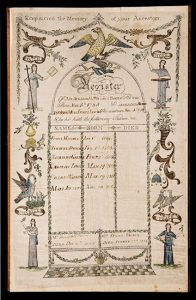
Over the centuries, families have kept their own records of their history – by writing it in family Bibles; by sewing it into samplers and other needlework; by having it engraved onto objects; and sometimes by writing it into preprinted family registers. NEHGS has launched a new database of family registers that have one thing in common: all were originally engraved by English-born Richard Brunton, who lived in New England in the years during and after the Revolution. Continue reading Richard Brunton’s family registers
A good index guides the reader
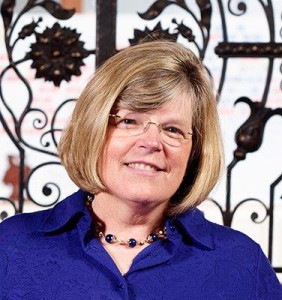 Yesterday, Alicia Crane Williams wrote about the steps she takes when indexing the Early New England Families Study Project, showing the extensive work that makes it possible for us to find ancestors in database searches. But what if you’re not creating a database, but writing a book instead?
Yesterday, Alicia Crane Williams wrote about the steps she takes when indexing the Early New England Families Study Project, showing the extensive work that makes it possible for us to find ancestors in database searches. But what if you’re not creating a database, but writing a book instead?
In the course of your research, have you ever picked up a family history and, to your dismay, found no index? With this experience in mind, if you are writing a family history, you must have an index for your work—at the very least an every-name index. Continue reading A good index guides the reader
‘A crescent moon followed the day god down’
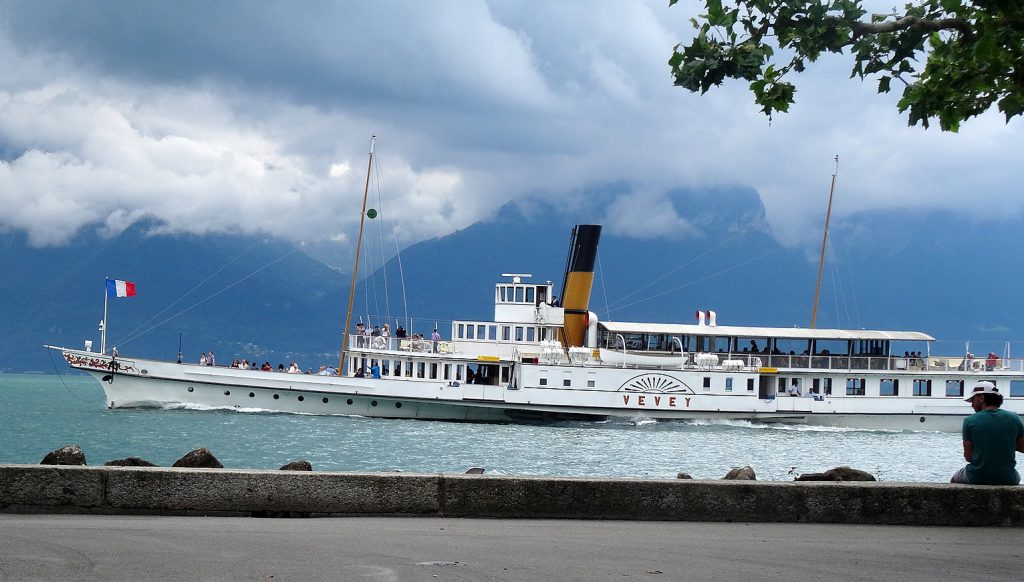
[Author’s note: This series of excerpts from the Regina Shober Gray diary began here.]
For those of us wiling away the summer in offices in the United States, yearning for a glimpse of blue water, here is a living portrait of a Swiss summer 138 years ago from the Gray[1] diary:
Hotel Monnet, ou “Les Trois Couronnes,” Vevey, Sunday, 4 August 1878: We are delightfully accommodated here; our rooms, including a handsome parlor with a broad balcony to our own use, look upon the lake, and to-day there has been a rowing race, wh. we watched with some interest; a sailing regatta fails to take place for want of a wind. The weather to-day has been lovely – but it seems clouding over now. Continue reading ‘A crescent moon followed the day god down’
Are we having fun yet?
 I am definitely regretting getting into the “ladies” sketches for the Early New England Families Study Project. While working on the sketch for William Lord of Saybrook, Connecticut, who had fifteen children by two wives, I recognized that his second wife also had at least one child by her first husband, John Brown of Swansea, which qualifies her for an Early New England Families sketch of her own. Continue reading Are we having fun yet?
I am definitely regretting getting into the “ladies” sketches for the Early New England Families Study Project. While working on the sketch for William Lord of Saybrook, Connecticut, who had fifteen children by two wives, I recognized that his second wife also had at least one child by her first husband, John Brown of Swansea, which qualifies her for an Early New England Families sketch of her own. Continue reading Are we having fun yet?
Road trips
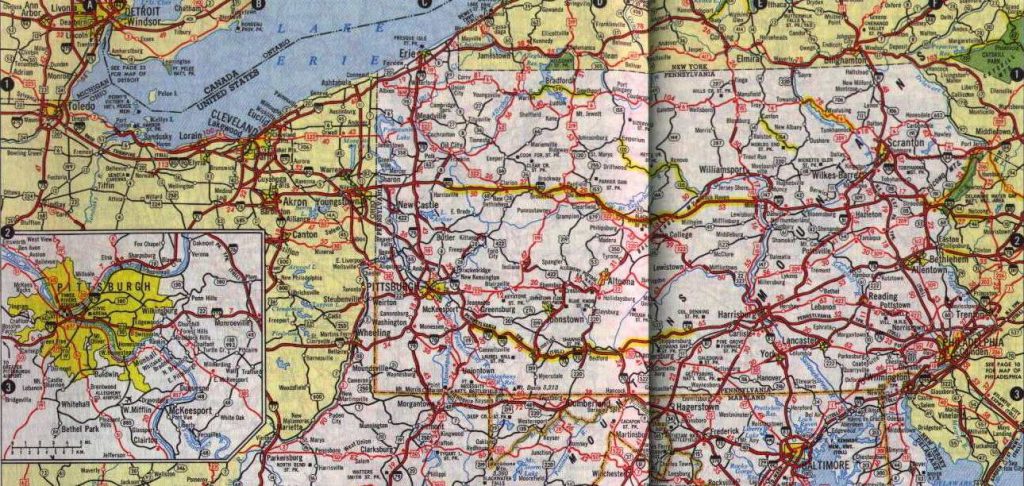 It is summer time and the siren call of the road echoes through my mind: “Come explore! Leave your desk and your clutter. Forget the phone, pack your car and come explore!” When we were children, summer meant road trips to far off and “exotic” places such as Nova Scotia, Prince Edward Island, and Quebec. One memorable summer we took a four-week camping trip across the country from Washington, D.C., to the Colorado Rockies to explore the old Moffat Railroad over the Continental Divide. Four squirming children and two adults crammed into a Dodge Sedan towing a trailer with the tent and other camping gear (no pop-up camper for our family). Continue reading Road trips
It is summer time and the siren call of the road echoes through my mind: “Come explore! Leave your desk and your clutter. Forget the phone, pack your car and come explore!” When we were children, summer meant road trips to far off and “exotic” places such as Nova Scotia, Prince Edward Island, and Quebec. One memorable summer we took a four-week camping trip across the country from Washington, D.C., to the Colorado Rockies to explore the old Moffat Railroad over the Continental Divide. Four squirming children and two adults crammed into a Dodge Sedan towing a trailer with the tent and other camping gear (no pop-up camper for our family). Continue reading Road trips
Massachusetts towns
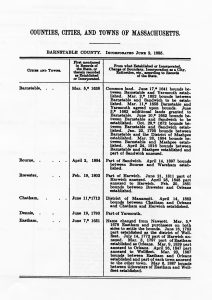 There are any number of reference books with information about when and how the towns of Massachusetts were incorporated. One is Historical Data Relating to Counties, Cities, and Towns in Massachusetts, by Paul Guzzi, Secretary of the Commonwealth, published in 1975. My copy is well worn and loved, but at the moment it is hiding from me (I know that all the books come out at night and move themselves around). Since I am trying to compose an article about the settlement of Cape Cod and really need the resource, I turned to the Internet to find an online copy. The 1975 book is not available as an ebook, but the earlier edition, published in 1920, is available for download.[1] Continue reading Massachusetts towns
There are any number of reference books with information about when and how the towns of Massachusetts were incorporated. One is Historical Data Relating to Counties, Cities, and Towns in Massachusetts, by Paul Guzzi, Secretary of the Commonwealth, published in 1975. My copy is well worn and loved, but at the moment it is hiding from me (I know that all the books come out at night and move themselves around). Since I am trying to compose an article about the settlement of Cape Cod and really need the resource, I turned to the Internet to find an online copy. The 1975 book is not available as an ebook, but the earlier edition, published in 1920, is available for download.[1] Continue reading Massachusetts towns
A voice from the Revolutionary War
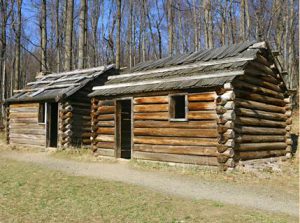
While recently researching an American Revolutionary War soldier who was a lieutenant in the Eastern Battalion of the Morris County, New Jersey militia, I encountered a fascinating historical text from 1975 entitled New Jersey in the American Revolution, 1763–1783, A Documentary History. This text was produced by the New Jersey Historical Commission and edited by Larry R. Gerlach.
There are countless texts and online resources available which accurately state the causes and consequences of the Revolutionary War, but I have encountered few sources which display first-hand accounts of men (and women!) in such a detailed and biographical sense as this text. Continue reading A voice from the Revolutionary War